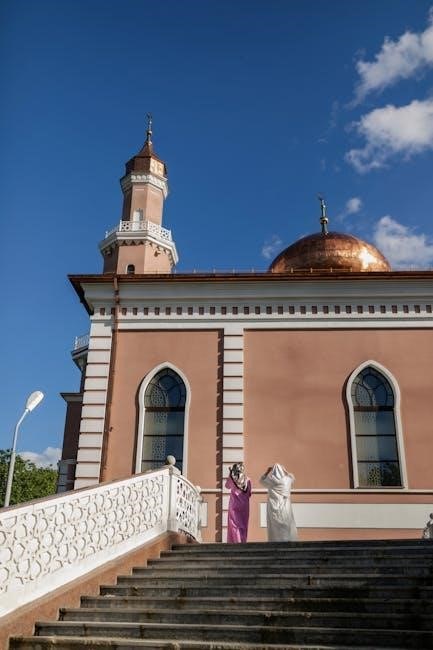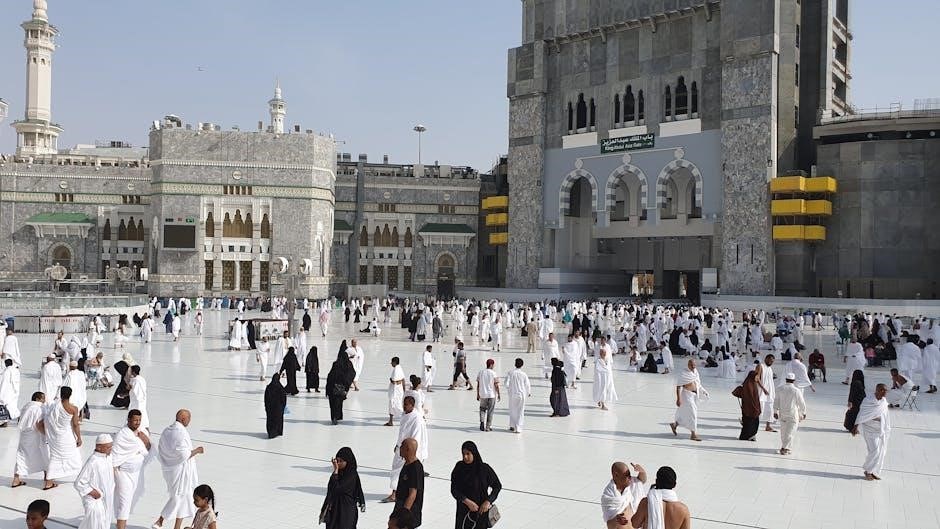
The 9-day novena prayer for the dead is a traditional Catholic devotion, offering comfort to the grieving and spiritual support for the deceased’s soul. It typically begins the day after burial or cremation, involving prayers, litanies, and reflections on Christ’s passion, seeking eternal rest and divine mercy for the departed.
What is a Novena?
A novena is a nine-day prayer devotion, traditionally practiced by Catholics, seeking spiritual guidance, mercy, or consolation. It involves praying for a specific intention, often for the deceased, and may include Rosaries, litanies, and reflections on sacred themes. This practice emphasizes faith, hope, and the belief in divine intercession.
Significance of Praying for the Dead
Praying for the dead offers spiritual support to the deceased, aiding their journey toward eternal rest. It expresses love, hope, and faith in divine mercy. Such prayers bring comfort to grieving families and foster a sense of community, emphasizing the importance of intercession and the belief in the soul’s purification before entering heaven.
Structure of the 9-Day Novena
The 9-day novena prayer for the dead is a structured devotion starting the day after burial or cremation. Each day focuses on specific themes, such as forgiveness, mercy, and eternal rest. Prayers, litanies, and reflections on Christ’s passion are included, with the ninth day concluding the novena, offering final intercessions for the deceased’s soul.

History and Origins
The 9-day novena prayer for the dead roots in Catholic tradition, evolving from early devotions for the deceased. Its origins trace back to ancient practices of praying for souls, influenced by Filipino and other cultural traditions, emphasizing a solemn period of mourning and intercession.
Roots in Catholic Tradition
The 9-day novena prayer for the dead is deeply rooted in Catholic tradition, emphasizing prayers for the deceased’s eternal rest. Originating from early Christian devotions, it reflects the Church’s belief in purgatory and the power of intercession. The Rosary, a cornerstone of Catholic prayer, is often central to this practice, reinforcing its historical and spiritual significance within the faith.
Evolution of the Novena Practice
The novena practice has evolved from traditional recitations to digital formats, enhancing accessibility. Filipino Catholics incorporate it with Rosary prayers and Masses, while its global reach extends through online PDF guides. This adaptation ensures the novena remains relevant, blending cultural and liturgical traditions with modern technology.

Structure of the 9-Day Novena Prayer
The 9-day novena prayer for the dead begins the day after burial, involving daily prayers, reflections, and specific focuses, such as forgiveness, mercy, and eternal rest, to honor the deceased and seek divine mercy.
Day 1: Prayers for Forgiveness
Day 1 focuses on seeking divine pardon for the deceased, with prayers requesting forgiveness for their sins. It includes invocations to saints and reflections on Christ’s sacrifice, emphasizing the importance of cleansing the soul for eternal rest. This day sets the tone for the novena, asking for God’s mercy and compassion.
Day 2: Reflections on Mercy
Day 2 emphasizes divine mercy and compassion, with prayers and litanies invoking Jesus’ loving kindness. It reflects on God’s boundless forgiveness and the hope of eternal life. This day’s prayers seek to comfort the grieving and assist the deceased in their purification, drawing strength from Christ’s merciful love and intercessions of the Blessed Virgin Mary.
Day 3: Invocation of Saints
Day 3 focuses on invoking saints and holy souls to intercede for the deceased. Prayers call upon the Blessed Virgin Mary, St. Joseph, and other saints to assist the soul’s journey. This day emphasizes the communion of saints and their role in offering spiritual support, seeking divine mercy and eternal rest for the departed through their intercession.
Day 4: Prayers for Eternal Rest
Day 4 focuses on prayers for eternal rest, emphasizing Christ’s resurrection as a source of hope. The Rosary, De Profundis, and Eternal Rest prayer are central, seeking comfort and peace for the deceased. This day also includes prayers for the soul’s liberation from purgatory, reflecting the community’s support in their grieving and spiritual journey.
Day 5: focus on the Passion of Christ
Day 5: Focus on the Passion of Christ
Day 5 emphasizes the Passion of Christ, reflecting on His suffering and death for humanity’s salvation. Prayers focus on the Stations of the Cross, invoking Christ’s mercy and grace for the deceased. This day’s prayers seek to align the deceased’s journey with Christ’s sacrifice, offering hope for eternal peace and rest through His redemptive love.

Day 6: Litanies and Intercessions
Day 6 involves litanies and intercessions, seeking divine intervention for the deceased. Prayers include invocations to saints and angels, asking for their intercession on behalf of the soul. Litanies emphasize mercy and forgiveness, while intercessions plead for the soul’s purification and eternal rest, reinforcing the communal aspect of praying for the departed.

Day 7: Prayers for the Soul’s Journey
Day 7 focuses on prayers for the soul’s journey, seeking divine guidance and comfort. These prayers emphasize trust in God’s mercy, asking for strength during the soul’s transition. They include petitions for the soul to overcome purgatory’s trials and enter eternal light, ensuring a peaceful and swift passage to eternal rest.
Day 8: Seeking Divine Mercy
Day 8 emphasizes seeking divine mercy, invoking God’s compassion for the deceased. Prayers focus on forgiveness and eternal rest, often including the Litany of the Saints and the Rosary. This day reinforces trust in God’s infinite mercy, asking for the soul’s swift purification and entry into eternal life, guided by divine love and grace.
Day 9: Concluding Prayers and Reflections
Day 9 marks the conclusion of the novena, offering final prayers for the deceased’s eternal rest. Reflections focus on gratitude for the loved one’s life and a formal farewell. Prayers seek divine peace and guidance for those mourning, while reaffirming faith in eternal life, bringing comfort and closure to the grieving family and friends.
How to Pray the Novena
Pray the novena by reciting daily prayers, litanies, and reflections for nine consecutive days, beginning the day after burial. Include the Rosary and invocations to saints for divine mercy and comfort for the grieving, supporting the soul’s journey toward eternal rest.
Step-by-Step Guide
Begin each day with an opening prayer, followed by specific daily intentions and reflections. Recite the Rosary daily, incorporating litanies and invocations to saints. Conclude each day with a closing prayer, seeking divine mercy and eternal rest for the deceased. Maintain consistency for nine consecutive days, starting the day after burial or cremation.
Opening and Closing Prayers
The opening prayer begins with praise to God, acknowledging His mercy and resurrection. The closing prayer invokes divine mercy, seeking eternal rest for the deceased. Each day’s prayers include invocations to Jesus, the Holy Spirit, and saints, accompanied by the Rosary and litanies. These prayers provide comfort to the grieving and aid the soul’s journey.
Role of the Rosary
The Rosary plays a central role in the novena, recited daily to honor the deceased and seek eternal rest. Each day’s prayers focus on specific mysteries, offering comfort to mourners and intercession for the soul. This tradition emphasizes communal prayer, aligning with Catholic devotion and fostering spiritual support for the departed.
Significance of the Novena
The novena offers comfort to the grieving, providing solace through prayer and reflection. It emphasizes intercession for the deceased, seeking eternal rest and divine mercy, while fostering spiritual growth for the living.
Comfort for the Grieving
The novena provides emotional and spiritual solace to those mourning the loss of a loved one. Through structured prayer and reflection, it helps process grief, offering hope and reassurance of eternal rest for the deceased. The communal nature of the novena fosters a sense of unity and support among family and friends.
Spiritual Benefits
The novena prayer offers profound spiritual benefits, providing a structured way to seek divine mercy and forgiveness for the deceased. It aids the soul’s journey through purgatory, fostering hope and eternal life. Participants also experience spiritual growth through consistent prayer and reflection, deepening their faith and connection with the divine.

Downloading the PDF
The 9-day novena prayer for the dead PDF is easily downloadable online, offering a free, comprehensive guide with daily prayers, litanies, and reflections for the deceased.
Where to Find the Novena PDF
The 9-day novena prayer for the dead PDF can be downloaded for free from various online platforms, including Catholic websites, Scribd, or Google Drive. It is often available through parishes or religious organizations, ensuring easy access for those seeking to pray for their loved ones. The document is typically free of charge and easily accessible.
What to Expect in the Document
The 9-day novena prayer for the dead PDF includes structured daily prayers, litanies, and reflections. Each day focuses on specific intentions, such as forgiveness, mercy, and eternal rest. The document also contains invocations to saints and angels, along with opening and closing prayers, providing a comprehensive guide for praying for the deceased soul.

Cultural Practices
The 9-day novena prayer for the dead is deeply rooted in Catholic traditions, particularly among Filipino Catholics, where the Rosary Novena is a popular practice, prayed for nine days to honor the deceased and provide comfort to the grieving family.
Filipino Catholic Traditions
Filipino Catholics observe the 9-day novena prayer for the dead with deep devotion, often beginning the day of death. Families gather to pray the Rosary Novena, seeking eternal rest for the deceased. This tradition emphasizes collective prayer, comfort for the grieving, and spiritual support for the soul’s journey, blending faith and cultural heritage.
Other Cultural Observances
Beyond Filipino traditions, the 9-day novena prayer for the dead is observed in various Catholic cultures worldwide. Many communities incorporate special hymns, feast days, or unique rituals, blending universal prayers with local customs. This reflects the global unity in praying for the deceased, seeking divine mercy, and comforting the grieving through shared faith practices.
The 9-day novena prayer for the dead is a deeply meaningful Catholic tradition, offering solace to the bereaved while seeking eternal rest for the deceased. Through its structured prayers and reflections, it honors the departed and strengthens faith, providing a profound way to remember loved ones and trust in God’s mercy and grace.